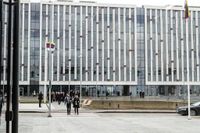Vilnius University has taken a significant stand against the improper use of artificial intelligence (AI), resulting in the expulsion of ten students over the past year. This action highlights the growing concerns within educational institutions regarding the ethical and appropriate use of AI in academic settings.
According to Valdas Jaskūnas, the university's vice-rector for studies, these expulsions were primarily due to students failing to disclose the use of AI in their work, specifically in final theses. "Over the past year, about 10 students have been expelled from Vilnius University for improperly using AI in their work, such as in their final theses. Improper use means failing to disclose that AI was used," Jaskūnas explained.
While AI remains permissible at the university, the incidents reflect a broader trend affecting numerous institutions. Nora Skaburskienė, director of the Studies Directorate at Vilnius Tech, noted that similar issues are emerging at her institution as well. "Instructors have mentioned that some students do use AI, and there have been cases where a student received an 'N' grade – indicating academic dishonesty – on their final assessment," she stated.
Students reportedly use AI tools primarily for crafting written assignments and sourcing references. Skaburskienė emphasized the importance of instructors carefully reviewing both assignments and grading criteria to ensure that the integrity of the evaluation process is maintained. "We encourage instructors to review both assignments and grading criteria, because, ultimately, assignments determine whether a student demonstrates their own thinking and critical reasoning rather than just repeating information," she remarked.
Despite these concerns, a student union representative expressed skepticism regarding the notion that students are largely misusing AI. Gabija Juzėnaitė, who represents the student body, commented, "If we’re talking about generative AI, it makes a lot of mistakes, and I think many students recognise that. It cannot provide precise citations and makes errors in citing sources." This perspective suggests that students are often aware of the limitations of AI technology.
Further emphasizing the risks associated with AI, another student, Nikodemas Girčys, highlighted the educational implications of over-reliance on technology. "There’s already a noticeable gap – relying on AI tools means some skills that would have developed naturally simply don’t form. This creates knowledge gaps," Girčys said, acknowledging the potential impact of AI on learning and skill acquisition.
Universities are also facing challenges in detecting the misuse of AI. The reliability of plagiarism detection tools has been questioned, leading to a reliance on experienced instructors to identify improper usage. "Experienced instructors who understand their subject matter are often the ones who catch AI misuse," Jaskūnas noted, pointing to the critical role of knowledgeable faculty in maintaining academic standards.
The rising instances of AI misuse within educational institutions are prompting a reevaluation of policies and regulations surrounding its usage. The situation at Vilnius University exemplifies a larger global trend in higher education, where administrators are grappling with how to integrate AI responsibly while preserving academic integrity.
As AI technology continues to evolve, institutions face the ongoing challenge of adapting their guidelines and educational practices to ensure that students are developing essential skills while also navigating the complexities of modern technology.


